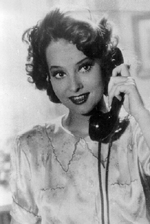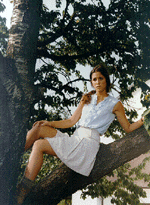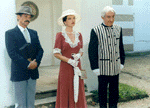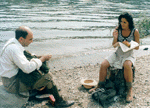
Emmi: Zita Szeleczky,
in the film by
Sándor Szlatinay
1940
43 KByte
Károly Aszlányi's novel, entitled Much Ado About Emmy, is being made into a movie for the second time. In the film made in 1940 Emmy, the demonic adolescent girl, was played by Zita Szeleczky and Málnássy, the spoilt landowner by Pál Jávor. The '98 version is directed by György Molnár, while the bizarre couple is played by János Kulka and Gabi Gubás.
The shore of the Danube, the ferry at Kisoroszi, sweltering heat, a crew of about 30 people.. The scene is the 1930s, it is important that not a single power-boat be seen. Málnássy would like to sell his jacket to the ferry-man and buy some food. It has been days that he and his lover, the wayward and erratic Emmy, have been on the road, and Emmy had insisted that they wander without money....The take is completed, the director is happy, and it is lunchbreak for the crew...
How did you come to cast Gabi Gubás, an actress for whom this is her first role on film, as Emmy?
M.GY.: I started looking for young girls, and I mentioned this to András Bálint among others, who asked me if I have seen Gubás, to which I said I did on a photograph, as I catch my bus at the Radnóti Theatre every day... Then, after the test-shootings, it became obvious she was really best fit to play this character.
May I mention that Aszlányi's Emmy is a red-haired demon?.
M.Gy.: Aszlányi writes at one place that he really does not know if Emmy is a child or a mature woman, or why Málnássy is so much into her, as in truth she is not that sexy. There are two things that I find interesting in this story. One is that leaving the common day, politics and other trashy things - that may look terrible important though they are not - behind, let's pay our attention to something truly essential. In my films, for that matter, I have always dealt with matters different from what humankind habitually ruin their lives with, and I have turned to things like pleasurable trifles, attraction, love, emotions. Emmy is not a crime story, nobody is shot at, nobody dies. There is a man, originally a liberal arts graduate, just about to turn old, but not quite old as yet, when a last chance presents itself for him to live freely and enjoy something of the essence of life. This man Málnássy, an aborted politician, was a poor man just a few years ago. Then he got involved in politics and suddenly found himself in the possession of a 600 acre estate with a castle. Isn't that a well-known situation? Right now, however, he happens to be a politician of the non-ruling party, i.e. he is on the road to ruin again. And that's when he sets out on a hiking tour with a young girl and abandons himself to a true emotion. On the other hand, we have Emmy... the story of how she loses her innocence. Yes, this girl loses her innocence here, but not in the cheap way that one sees multiple times daily on Hungarian television channels, i.e. two people meet up and then right into bed, where a terrible amount of rutting is started... she is a great girl, and does not give herself cheap, even when she too is in love.
If I understand you correctly, you have sent eroticism into exile here?
M.Gy.: I excluded pornography, not eroticism, from my film. I do hope that every single take in this film is erotic, yet in a delicate way, in a real way, the way we really wonder at each other...
Málnássy's career is certainly very familiar. You could have adapted the story into the present day.
M.Gy.: Well, that could not have been done, for a number of reasons. Aszlányi himself deserves that one leaves his novel as he wrote it, and on the other hand I believe that viewers as well as myself enjoy ages different from our own. Great actors, great costumes,... dresses can be worn differently, objects can be played with in a different way, one moves in different spaces, and this is good. It is good to see, too.
You must have made up your mind about the style, the genre of this film. Is it going to be a comedy or more of a satire?
M.Gy.: A comedy, but even a burlesque at times... this in fact is rather difficult. And there is even a further problem to be solved, namely that I think it would be fortunate if the film reminded one of the great Hungarian comedies of the 1930s. That which one liked in those films should somehow be saved. Of course, my woman and my man are both more real than in those films. Another thing that may sound strange is that this film in a sense is a road movie. These people have hit the road, and the visual interpretation will certainly attempt to recreate the appropriate style.
What is the material that you hold in your hands? Would you like to present Károly Aszlányi, who I think is rarely read today?
M.Gy.: There was an unbelievable number of story-writers in the 1930s, sometimes condemned by aestheticians, who are no longer that condemned today, as many of them later went to America, where they wrote masses of very successful films. From those who stayed at home, Vaszary or Aszlányi were the most talented. I have read an aesthetician who concluded that had Aszlányi lived longer than his 30 years, he might easily have developed into a writer of Karinthy's capabilities. I believe he was the dramaturgist of the National Theatre. What is interesting in Emmy is that on one hand it entirely satisfies contemporary criteria of success, - i.e. ageing man falls in love with young girl, there is a castle, no poor people are seen, - it is, however, not the kind of deceptive secretary-chief executive situation, it is much more real and truthful, while it has a playful and cheerful quality. Also, the entire structure of the novel is modern. Aszlányi - while preserving the style of comedy that has been practised with such perfection in Central Europe, i.e. the typical Budapest humour, - used something of the then very modern American dramaturgy. Just think of Seven Hits in the Face.
You do like coming and going in the company of the writers of the '20s and the '30s...
M.Gy.: We may not have had a volume of Aszlányi at home, but we certainly had a Vaszary, a Rezső Török, and of course novels by Márai, Zilahy in the book-case. And one, in one's childhood, at least then, certainly read what the family had in the book-case. I and my colleagues have just thought of the fact that I have never before got as far as 1935, which is the year when Emmy was written. I always got stuck at around 1920. My pervious film's literary raw material, Kosztolányi's The Bad Doctor, is an earlier story, written in 1920. Also Géza Csáth's short stories are earlier, from which the The Wizard's Dream was made.....
Can a lighter story, especially if it is made on commission, be filmed with the same enthusiasm as you feel while adapting a story by Kosztolányi or Csáth you have selected yourself?
M.Gy.: Whatever one does must be done with the same conscientiousness. Yet there is work done on commission and there are things that lie at one's heart. This, of course, is not some kind of a private sorrow. I, for example, am not a drug addict and have never been. Yet the Wizard's Dream - which is my best-known work selected to be part of the Film Collection at the New York Museum of Modern Art, is still very personal to me, for millions of small secrets. And in spite of the fact that the film adaptation of Milán Füst's Three Foreign Gentlemen has been done on commission, I do not think it makes the impression of having been got over with carelessly...
Do you know the Emmy film made with Pál Jávor and Zita Szelecky?
M.Gy.: I know that it exists, I discovered it in the Film Lexicon, but I decided not to see it. At first I thought I would see it, but then I realised it is better not to.
In the afternoon, a large portion of bacon is served to the exhausted Kulka-Málnássy. Emmy had compassion with the man and got him something to eat, and now Kulka is stuffing large pieces of bread and bacon into his mouth in close-ups...... At last it was OK, at last it is finished....
Have you ever played in Aszlányi's Emmy on stage?
János Kulka: No. And as far as I know the play has not been staged since the war at all. Yet now it is performed in Szeged.
This means the story is topical for some reason.
János Kulka: It happens to dramas or stories that all at once they are rediscovered and they surface at a number of different sites. A film, however, was made of the original novel back in the 1930s, that I know of, starring Jávor, Szeleczky and Csortos. I have not seen that film, but once we are finished with the shooting I will go to see it.
Is the acting that you do in this film with Gabi Gubás, Dezső Garas and Miklós Benedek very far from that old way of acting?
János Kulka: I do not quite know, I for my part love those old films a great deal. And rarely ever do I feel what others hold to be true, that those actors play in an old-fashioned way. What I like is that they are present in the film in such a devoted and strong way. Men are very much men, and women are very much women.... that was good acting in the best sense. I do love Karády as well, as much as she is criticised, and I can't think she was bad. And one should always remember that these actors were at the same time outstanding personalities of the then theatre as well.
Can a character like Málnássy be played in any other way than as a star? I mean that Pál Jávor was first of all himself, the famous "Jávor" in this role, and Gábor Málnássy only in parentheses. And you yourself are "Kulka" in the first place, and only in the second are you a landowner in love from the 1930s....
János Kulka: Oh, no, not at all! I do not really know... The idea of course is very honouring, but I do not know what to say, because this is not the way I see it. What I know is that this is a role that is a pleasure to play, and it is a true wonder to me that there is a film in which - unbelievable as it is - I play from the beginning to the end.
Who on earth is this Gábor Málnássy, by the way?
János Kulka: What happens is that one makes oneself believe that the character is no one else but himself. Being an actor is not a science, and to talk about it is very difficult.
What will the impact of the character be? Is the audience going to laugh at the character, or are we to see a very serious melodrama?
János Kulka: The character should be real. Whether the audience is going to laugh or not is not my business. Being funny - however - is something we should certainly avoid, that is for sure. One must act out real situations in the most credible way possible. Being funny is to be avoided on the stage too, and the actors should forget that they happen to be playing a comedy.
Yet now, when you had to swallow a large amount of bacon, the spirits of the whole crew were very much up..
János Kulka: This is an excellent example, because I did have to swallow that bacon. That man is really hungry, he has not had a bite since the morning, he is a spoilt, wealthy man and with the approach of the evening he makes a pig of himself, stuffing bread and bacon into his mouth with both hands. Yet this is something I have to do in the same way, whether I do it in a drama of Shakespeare or in an Aszlányi. And this will perhaps cause a smile in the film in the right place.
Having seen the way some of the takes are made, I have the impression that what you and Gabi do here is more theatre than film.
János Kulka: Never in my life have I shot a film like this, i.e. playing in almost every one of the takes. And I do hate making films. Simply because I do not know how to do it, you know what I mean, too much of this, too little of that.. I do here what I have always done on the stage, although I feel a lot more at home there, a lot more uninhibited. In fact I do not really like the way a film is made, that the whole is made up of tiny little parts..... I am never at a loss on the stage, I do everything I am asked to without giving it a second thought, whereas I feel quite disturbed by the camera. There is one thing, however, that I know and that I have learnt, i.e. there is nothing but one's personality, one's feelings, thoughts, which - with very focused concentration, - can somehow be transferred to the audience. I think those who only make films are in a more difficult situation, because if they then get to the stage, they will find that the stage has very severe laws.... But now I need to go, because Gyuri Molnár is waving his hand to me...
What is the next take?
János Kulka: Two gendarmeries take us to the local station because Gabi and I stole melons...
A day has gone by since the take with the gendarmeries. We are still at Kisoroszi. The shore, sweltering heat, forever new takes. The director and the director of photography hide beneath a large black sheet before every one of the takes, because that's where the controlling monitor is situated. For the layman it is often so comic to see all these adult people playing film-making...
The commission was given by Hungarian Television, but perhaps Emmy will find its way to the movies as well...?
M.Gy.: I do not know, we have not thought of that, and it was not made for that. Although I am not surprised at anything in the modern world, who knows, people may even go to see it.
The reason why this came to my mind is that the picture is masked both above and below, which makes it look more like a movie than a television production....
M.Gy.: There are many reasons why we have masked the pictures, one is composition. What picture shape we use is always a matter of decision - one of the few cases where we can make one at all. On the other hand, avoiding the shape that current programs, e.g. entertainment programs, commercials, etc. have was also essential. Where a film is screened and who are its real viewers is something that is quite changing in the modern day - except for the perhaps one hundred or so American super-productions yearly that get to the movies of the world. For the rest of the films, their real appearance happens in television. The movie is just a kind of promotion. It was a few years ago that I was first astounded by this tendency, when I heard that the new Alain Delon film was seen by no more than three hundred thousand people in the movies. It was an entertaining film with an international star... when the film was bought by televisions, and the proportions got settled into their right place.
Having said that, professionals of film in Hungary have always made a very sharp distinction between television films and movies...
M.Gy.: In truth, what settled this already then was where one could do a film. As for myself, I have always been in between the two, neither a television man, nor a movie man proper.... or rather both. It is often said that God Almighty spits out the shilly-shallies. Yet on the other hand, I like to console myself with saying that I have raised myself above all kinds of professional groups or cliques.
You belong to the few who - during these rather dark last years - have been able to do successful productions. What we understand by success today is, of course, another question.
M.Gy.: These are very strange things indeed. The Bad Doctor, which was not sent to a single festival and was not screened long in the movies either, was seen by nearly two million people on television. i.e. every fifth Hungarian. That is a very impressive figure. Its audience ratio was worse that that of Dallas, to be sure, but it was on the top ten list that month. Anna's Film, on the other hand, was seen by fewer people, but it won several prizes. In its time it was the second most seen film after We Shall Never Die. There was certainly a long pause between these two, but the latter did not get this terrible, three-thousand or something kind of statistics. There are millions of reasons why people don't go to the movies any more. Those middle class people who would go to see these movies cannot afford to pay fifteen hundred forints for two tickets any more.
Does the fact that Emmy was filmed on video material mean any compromise to you?
M.Gy.: We did not have a chance to make it on celluloid, it would have made it so much more expensive. But there are upsides to video-technology, e.g. that one does not need to economise with the raw material that much, and there is not the kind of crazy nervousness if one can only get hold of a third-class camera....
Two weeks go by, shore takes - Thank God - are over. And it did not rain a single time. Relaxing takes in Budapest, before the long time to be spent in Zsenye.
M.Gy.: We are having one of our easier days today. I like these days, when everybody is working hard, but when presence is more important than giving everything into it. This is that part of film-making which acquires importance during editing, i.e. in through the door, out of the door, music to it. We are having a montage day today. We have to be careful that we do not get out of rhythm, but in actual fact it is not difficult. We have completed one third of the shootings, as well as technically rather difficult things. And we have been keeping our fingers crossed that rain should not ruin us. And it did not rain. It rained all around Budapest, but not here. And that is a good omen. If a film lets itself be made, - there is something mystical to that.
Will everything happen exactly as you have put it down in the screen-play?
M.Gy.: I allow myself more freedom today than I used to. In the old days I was very precise about putting everything down and sticking to it. I still continue being precise about things, but there is a trifle of freedom inside now... what turns out to be three takes does not need to be one at any cost, and vice versa. And, although I do not know if it is good or bad, but I see the film roll by in my mind's eyes. I can hear the actors say the lines. And if what I hear is worse in reality, I give them a hard time until they say it the way I want to hear it..
Aren't the crew getting exhausted?
M.Gy.: The fifth or the sixth day, if I remember well, last Friday, we pretty much had a crisis. We have been totally overworked because of the shootings at dawn, there was an explosion, and in addition we had to go among a herd of cows... but you get to a stand-still like that every now and then. I once heard that Márton Keleti had a legendary screen-play where on the fifth day he wrote: Screaming.
Do you indicate in your screen-play at the end of the day the parts that you are finished with?
M.Gy.: Of course I do, I always keep track of camera directions, although it is quite in my head after so many years, but I keep writing them down, then I fold the corner of the sheet and check it once more at home, if we have really shot everything as written down, and in the end I cut that corner off. And the page that contains what is to be shot the next day I fold in two.
There is still as much as a week left. Fortunately, that will be spent in the Castle of Zsenye, which is as beautiful as a box of jewels. Garas arrives. He spends the long hours of decoration-alterations absorbed in his newspaper. He is rather unfriendly. He refuses to give an interview. Benedek is also here. He is a lot more friendly. But we still do not get to have a conversation.
Isn't this rather exhausting? Being together for three to four weeks.
M.Gy.: Yes indeed, but it is also a pleasure. A great adventure, a great journey.
Are you also a psychologist to your crew? Is it something a director should undertake?
M.Gy.: Yes, yes. I am a kind of Daddy to them, everybody is telling me all their problems, I listen to them, and then they feel much better.
And what can one see on the masters? You have completed a great number of takes by now....
M.Gy.: This is the monitor, we continually check what is being made, and we have made masters also today.
I think it is all right now. Making a film, however, has its regular process with ups and downs. At the time of the shooting, one is in a state of euphoric joy. Then, when the pieces are tied together, there comes complete desperation. Then again you fine-tune the editing somewhat, and the pieces seem to fall to their places and everything seems all right. Just like in the theatre. During the rehearsals one is terrible enthusiastic, only to find oneself quite out of sorts at the first general rehearsal in costumes and against the scenery. Then order is somehow reinstated again. These stations are probably unavoidable.
I asked Dezső Garas what kind of instructions you usually give. He told me to put that question to you.
M.Gy.: I never really think about the way I behave in my shoes. I try to get the actors into the mood that I think is required with a number of different tools. At times I am pretty clear that I happen to find something horrible, and at other times I patiently tell them where to sit. And whether to sit slowly or quickly. Once Jordán and Udvaros performed the way I act things out to my actors... we had a good laugh, but that's all right.
.
It is said that at your shootings there is always quietude and cheerfulness. Does it show on the finalised material what mood the shooting was done in?
M.Gy.: Yes, indeed.
Is it impossible to produce a masterpiece during a shooting in the worst possible mood?
M.Gy.: No, the possibility exists. But I am no so sure if it does a comedy any good. There may be a masterpiece, everybody is terribly upset and having a bad time, which perhaps contribute to the actors' credibility. If the raw material is like that. I do not know, everything is possible.
Will you tell me how much Emmy cost...?
M.Gy.: No. I made an oath never to disclose that figure. Because if in a country VAT, social security contributions, handling costs, the producers profit, etc. is of this magnitude, saying a figure of millions means nothing. Because the public is outraged at how many millions of forints are being wasted at film production. Meanwhile, half of that is just not true. Those who really do the film never get a third of that amount. All I want is to make this film look richer that in actually was.
You do not seem to be a gigantoman director.
M.Gy.: Yes I am, I am absolutely gigantoman, only I do not have the means to exercise my gigantomania. I wish that instead of the three gardeners here in Zsenye, I could have displayed thirty-three. Yet the bad news is that this could easily be the last film in the life of the Hungarian Television. I did not make the first one, but can easily become the one to have made the last..

Emmi: Gabi Gubás
in the film by
György Molnár,1998
(stand photo by: Claudia Csicsay )
208 KByte

Balázs Galkó , Adél Kováts ,
Dezső Garas
65 KByte

János Kulka and Gabi Gubás
81 KByte

Adél Kováts , János Kulka ,
Gabi Gubás
95 KByte

János Kulka and Gabi Gubás
93 KByte

György Molnár and János Kulka
88 KByte

